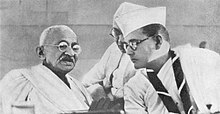All India Forward Bloc
All India Forward Bloc ( AIFB , Bengali সারা ভারত ফরওয়ার্ড ব্লক , Hindi ऑल इंडिया फार्वर्ड ब्लाक , " All India Progress Bloc") is a political party in India . She advocates a socialist social order with a specifically Indian character. Although the party only has a certain regional significance in the Indian state of West Bengal today, it is one of the oldest and most traditional parties in India.
Party history

The AIFB was founded on May 3, 1939, initially as a parliamentary group within the Indian Congress Party by Subhash Chandra Bose . Bose had long been a leading politician of the Congress party and was elected president in 1937 and 1939. On the question of resistance to British colonial rule in India , Bose took significantly more radical positions than Gandhi. Bose also advocated open resistance against the colonial rulers, while Gandhi only wanted to accept an exclusively non-violent approach. In addition, Bose also sought support outside of India in order to gain independence in a struggle for freedom with external help, if necessary, and decidedly refused to allow India to participate in the upcoming world war as part of the British Empire . Because of these differences, at Gandhi's instigation, Bose was isolated within the Congress Party. As a result, Bose resigned from his presidency on April 29, 1939 and a little later proclaimed the establishment of the All India Forward Bloc at a political event in Calcutta . At the first party congress of the AIFB from June 18 to 22, 1940 in Nagpur , a party program in which the AIFB defined itself as a socialist party, as well as measures to promote local self-government and to support resistance movements against British rule, were decided. June 22, 1940 is therefore regarded by today's AIFB as the actual date on which the party was founded. Bose's ideal, which was expressed in the party program, was a socialist society with national Indian characteristics under the slogan "Freedom, Democracy and Socialism". In many ways the “building of socialism in one country” in the Soviet Union was a model without Bose being a Marxist or a communist in the strictly ideological sense.
Bose called for resistance to the use of Indian resources for the war effort of the British Empire and was therefore initially imprisoned and later placed under house arrest. However, he was able to evade his guards and fled across the border to Afghanistan, first to the Soviet Union, where he found no support, and later to National Socialist Germany , from where he carried out propaganda for a free India and Indian soldiers of the British army who had fallen into German captivity, were recruited for use against the British ( Legion Free India ). He later continued these activities from Japan with Japanese support. Bose was killed in a plane crash towards the end of the war in 1945, the circumstances of which had not been fully clarified and therefore gave rise to speculation that he had been murdered. The AIFB was banned in India by the British on June 23, 1942, but it continued to operate illegally.
After the end of the war, the AIFB intensified its activities, initially out of illegality. In contrast to the Congress Party, the AIFB spoke out against the partition of India . AIFB supporters celebrated the anniversary of independence (August 15, 1947) as a national day of mourning. After Indian independence in 1947, the AIFB was affected by internal ideological differences. On the one hand, socialists with a strictly Marxist-Communist character and on the other hand, “subhashists”, who represented a less ideological socialism with Indian-nationalistic and spiritualistic elements, faced each other. In the Indian parliamentary elections from 1952 until today, the AIFB never rose above the rank of a small splinter party. He was never represented in the Indian parliament with more than 10 elected representatives (from 400 to 545 members). The party only achieved regional importance in the state of West Bengal, where it usually makes voting arrangements with the communist parties in elections. Comrade N. Velappan Nair has been party leader since 2005 .
To this day, the party maintains a pronounced Marxist class struggle vocabulary and holds up the memory of its party founder Netaji Subhash Chandra Bose.
Web links
- Homepage of the AIFB (English)
- http://eci.nic.in/eci_main/mis-Political_Parties/Constitution_of_Political_Parties/Constitution_of_All%20India%20Forward%20Bloc.pdf (link not available)
- All India Forward Bloc at elections.in (English)

